Cardiology Fellowship Research Updates
Research Fellowship Calendar:
MARCH 19, 2026
4:00-8:00 PM
Fellow Research Retreat 2025-2026
5th Floor Conference Room, Medical School Building
Announcements, Awards & Accolades:
Fellow Research Project Highlights
Faculty Research Project Ideas
| Faculty Name | Contact Email | Project Description |
|---|---|---|
| Melvin Klegerman | [email protected] | Contact faculty for more information |
| Sachin Kumar | [email protected] | Predictors of survival in patients with AMI complicating Cardiogenic Shock. |
| Sadia Ashraf | [email protected] | Effect of Nr4a2 induction on stress induced arrhythmias in mice. |
| Siddharth Prakash | [email protected] | Analyzing the relationship between central aortic hemodynamics and aortic disease progression using waveform analysis. Using AI to detect BAV and ascending aortic dilation in unselected echocardiograms. Phenotypes of individuals with rare genetic variants in BAV and HTAD genes. |
| Syed Wamique Yusuf | [email protected] | Contact faculty for more information |
| Danai Kitkungvan | [email protected] | Contact faculty for more information |
| Richard Smalling | [email protected] | Potential for myocardial salvage with an Endothelin antagonist prior reperfusion in an ischemic/reperfusion model. Development of an echo/X-ray fusion imaging system. |
| Romain Harmancey | [email protected] | Cardiac Olfactory Receptor Signaling in the Pathophysiology of Heart Failure: A mechanistic study in cells and mice. |
| Simbo Chiadika | [email protected] | Echocardiographic findings in Sickle cell disease. Atrial fibrillation QI. |
Our second annual Research Retreat took place in May 2025. Congratulations to this year’s winners!
- Immune Checkpoint Inhibitor-Associated Myocarditis Complicated by Conduction System Disease Needing Pacemaker Implantation: A Single Center Experience of Pacing Outcomes, by Dr. Nicholas King, Mentor Dr. Nicolas Palaskas
- In-Hospital Complications after Catheter Ablation for Supraventricular Tachycardia in Pregnant vs. Non-Pregnant Females: A Propensity-Matched Analysis, by Dr. Alexander Dang, Mentor Dr. Anne Dougherty
- The Safety of Contemporary Radiation Therapy in Patients with Cardiac Implantable Electronic Devices: Implications for Clinical Practice, by Dr. Martin Chacon-Portillo, Mentor Dr. Anita Deswal
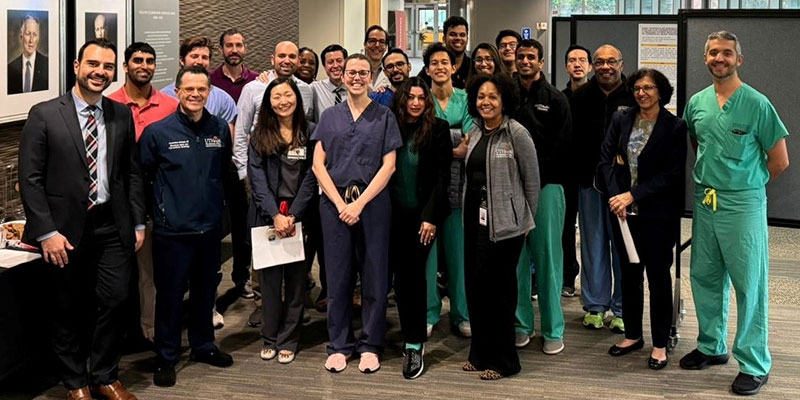
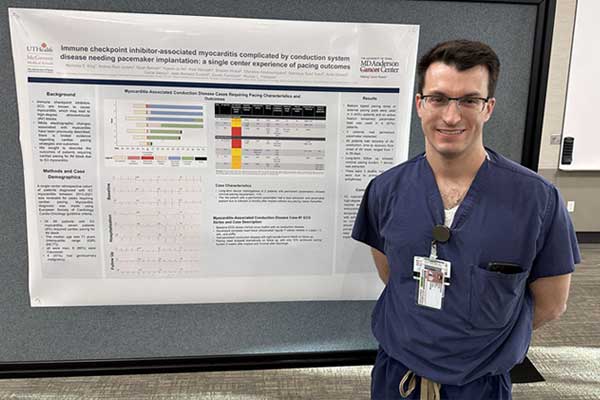
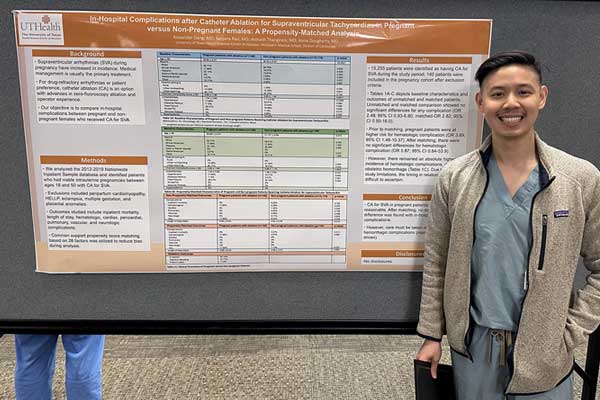
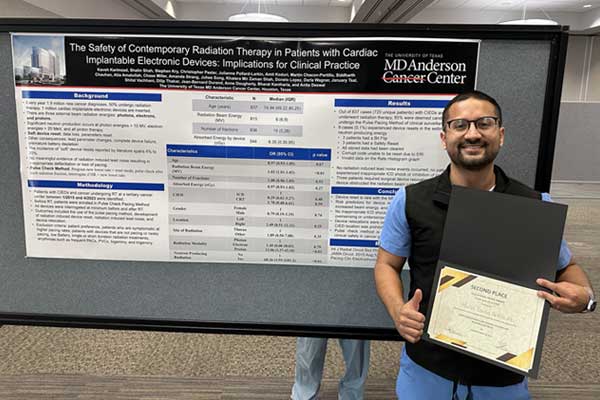
Announcing the 2024-2025 Fellowship Research Committee:
- Siddharth Prakash (Director)
- Efstratios Koutroumpakis (Director)
- Deepa Raghunathan
- Romain Harmancey
- Danai Kitkungvan
- Olasimbo Chiadika
- Anju Bhardwaj
- Sachin Kumar
- Sukdeep Basra (New Member)
- Soumya Patnaik (New Member)
- Heinrich Taegtmeyer (New Member)
- Wamique Yusuf (New Member)
- Poyee (Pansy) Tung, MD (New Member)
Thank you for your service!
Spotlight On…
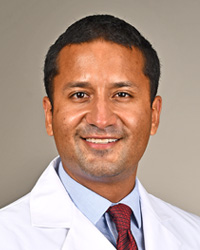
Where Are You From? Chihuahua, Chihuahua, Mexico
How did you get into Cardiology? I became fascinated with cardiology the day I read my first ECG in medical school. It was astonishing to see how a few lines and curves, when interpreted correctly, could help diagnose and triage patients with a wide range of pathologies. What continues to draw me to cardiology is the ability to evaluate the heart from all angles—its pumping, valvular, electrical, and vascular components—using advanced imaging technologies and minimally invasive interventions to provide truly comprehensive care. This holistic approach, where I can guide patients from their initial symptoms to definitive treatment, is incredibly fulfilling to me.
Tell us about your current research and what you love about it. My current research delves into the safety of performing radiation therapy on patients with cardiac implantable electric devices with personalized strategies, seeking to refine the detection of radiation-induced device complications and limit unnecessary testing and procedures. What excites me most is how our current research is attempting to redefine how cardiac implantable electric devices are configured to limit the number of interrogation sessions we perform and hopefully avoid delaying life-saving treatments such as radiation therapy in patients with cancer.
Research Newsletter:
Research Spotlight: Jong Kun Park, MD
 American Society of Echocardiography 2025
American Society of Echocardiography 2025
Exploring the Association Between Lipoprotein(a) and Diastolic Dysfunction in Assessing Cardiovascular Disease Risk – A Retrospective Analysis
Research Mentor: Dr. Deepa Raghunathan
Dr. Park’s research focused on investigating an association between lipoprotein(a) and diastolic dysfunction found on echocardiography. Dr. Park and his team conducted a single-center retrospective analysis and found that lipoprotein(a) alone is insufficient to predict the immediate onset of diastolic dysfunction in patients. A deeper analysis revealed that several factors, including a homogeneous cohort with predominantly healthy subjects and a lack of longitudinal temporal data between the variables, likely contributed to the statistical insignificance. Dr. Park is planning on organizing a larger-scale prospective trial, including global longitudinal strain along with advanced lipid profile tests, to provide a more robust analysis between lipidology and various echocardiographic parameters.
Research Resources:
How to Begin Research Projects at UTH: Practical Tips and Resources
By: Siddharth Prakash, MD, PhD
Adult Cardiovascular Genomics Certificate Course: free CV genetics training with CME credit
Access to large healthcare datasets (Medicare, Medicaid, etc)
Access to UT Physicians clinical data or MHH PACS data
Access to free clinical research training
Guidelines for Manuscripts: Reporting Standards
- CONSORT Guidelines (for reporting clinical trials)
- PRISMA Guidelines (for reporting systematic reviews)
- STROBE Guidelines (for reporting observational studies)